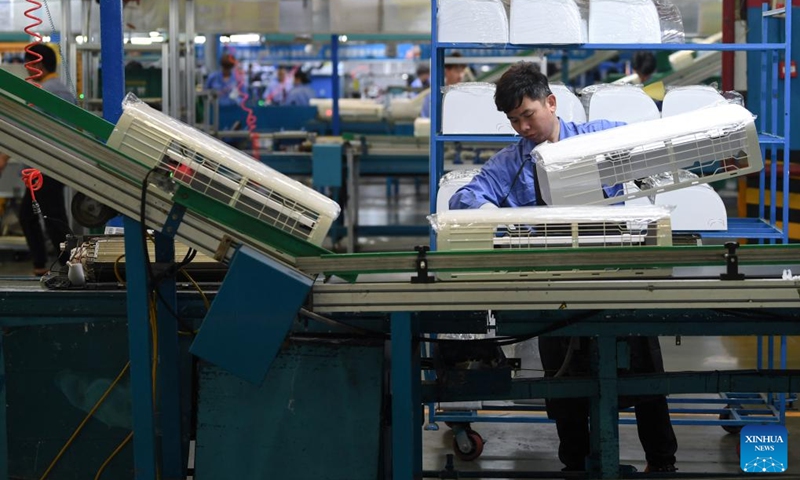NDRC encourages private companies to boost trade-in program for lifting consumption

A man works at a workshop of Midea Group in Guangzhou, south China's Guangdong Province, March 3, 2023. In recent years, south China's Guangdong Province has accelerated intelligent and digital transformation of manufacturing industry to promote high-quality development. Up to now, there are 67,000 industrial enterprises above the designated size and 69,000 high-tech enterprises in the province.(Photo: Xinhua)
The National Development and Reform Commission (NDRC), China's top economic planner, discussed with six private enterprises on Tuesday on work to replace old consumer goods with new ones and the roadmap for it, part of China's efforts to promote trade-ins of consumer goods amid a new round of consumption stimulation.
Analysts said that such efforts can help the construction of the circular economy and provide new impetus for economic growth from both supply and demand sides. They also noted that the upgrading of equipment is in line with China's high-quality development.
As the latest effort, the NDRC on Tuesday discussed the roadmap of the work with six private enterprises - JD.com, home appliance suppliers Midea Group, Haier Group and Gree Electric, electric two-wheeler manufacturer Yadea Group and waste recycling enterprise GEM Co.
This is the first symposium for the trade-ins of consumer goods and large-scale equipment renewal, aiming to collect feedback and suggestions from private companies, the top economic planner said.
Those companies said that the trade-in market is significant, and it is believed that they will have vast opportunities in front of them, reaffirmed by confidence in the company's future development.
This policy can promote the upgrading of consumption, accelerate the elimination of inefficient production capacity, and promote the upgrade of industrial structure, Hong Yong, an expert at the Digital Real Economies Integration Forum 50, told the Global Times on Tuesday.
"After receiving appropriate incentives, consumers are more willing to replace old products and buy new products, thus driving the sales growth of durable consumer goods industries such as home appliances and automobiles," said Hong, adding that related industrial chains will benefit from the trade-in program.
The renewal of equipment is estimated to generate a huge market operating at an annual scale of more than 5 trillion yuan ($692 billion), and the replacement of automobiles and home appliances will also create a trillion-yuan-scale market, an official representative said at a press conference on economy for the second session of the 14th National People's Congress on March 6.
Statistics from the Ministry of Commerce revealed that China's car ownership reached 340 million by the end of 2023, and the ownership of major household appliances, such as refrigerators, washing machines, and air conditioners, topped 3 billion. Some household appliances have been used for more than 10 to 20 years, which means that the demand and potential for replacement are great.
"Promoting the trade-ins of old consumer goods will help release the potential consumer demand for improvement, and further stimulate the vitality of the consumer market," Hong said.
Analysts also said that the trade-in and replacement policy will largely promote the development of new quality productive forces through industrial upgrading, as consumer demand will urge enterprises to produce consumer goods that are greener and smarter.



